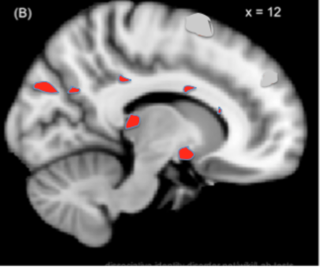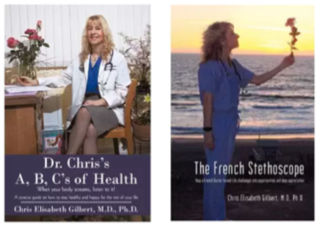Relationships
A Recipe for Finding True Love
To find true love, ask your body, not your mind
Posted September 13, 2016
By Guest Blogger Chris Gilbert MD PhD
I picked the wrong man to be my first husband because my parents were pressuring me to get married. I hadn’t met many men at that point of my life, and nobody had taught me how to find true love: not high school, not medical school, not even my parents.
So I "settled."
And I paid a steep price: my first marriage lasted less than three weeks.
Yet, I was determined to find a love that would last forever. I had a vision of being happy with my perfect match, of falling asleep in his arms, of waking up with a big smile on my face ready to take on the day. But how could I make that dream come true?
I decided to start my journey in a quest for true love using the power of the Internet. I joined a dating service and looked at hundreds of profiles. But looking at men’s profiles wasn’t enough. I had to meet them. Because I didn’t know any of them, I arranged to meet each time in a public place.
I selected 100 men and met about 50. Each time, I was very excited before the meeting but during the meeting, I had the feeling that something was missing. I didn't know what it was, though. Trying to analyze my feelings, sometimes I felt very attracted to the man’s body but not his brain. Other times, I liked the way the man was thinking but there was no sexual attraction. Once, the man was exactly what I was looking for on paper but when I met him, I felt ill at ease. My body didn’t feel comfortable with him. I listened to my body and said goodbye. I kept on meeting new people. I lost hope many times but never gave up.
When I met Steve, I felt something I had never felt before. It wasn't infatuation, it wasn't pure sexual attraction, it was a feeling that is hard to describe but I am going to try my best. It was a mixed feeling of deep comfort, inner peace, sexual attraction, emotional closeness, intellectual stimulation and fun. That was the feeling I had been looking for all those years without finding it. That feeling as I learned quickly, was reciprocal. A few years after the start of this wonderful relationship, we got married.
Unfortunately after 12 happy years of marriage Steve passed away from very aggressive brain cancer.
What was I to do now? Stay a widow for the rest of my life or start the exhaustive search for a life partner once more?
I decided to join an Internet dating service and look for true love again. Could I be lucky enough to find true love twice in my life when some people never found it once?
The advantage I had over the previous time is that I knew what I was looking for. I didn’t know the type of man I was looking for but I knew the feeling inside of me that I needed to experience: For me, encountering true love was having that special feeling inside both my body and mind: a unique mix of reciprocal sexual attraction, emotional closeness, intellectual stimulation, inner peace and fun. It is a chemical reaction that happens when two people meet and are right for each other. The feeling that together we are stronger that each of us alone and we can go through everything and anything together.
In search of that rare and elusive cocktail of feelings, I joined several dating services all over the world, selected over 200 men and met 120. I went to Singapore, Vietnam, Bali looking for Mr. Right. I didn’t care where I would end up living. All I knew is that I wanted to find true love again. I lost hope several times. Many times and for several years, I felt that I was like a leaf floating on the ocean, not knowing where I was going, at the mercy of rip tides, destructive currents and predators. Yet I kept on going, continuing to meet more men. What was the point of making money if I had nobody to share it with? What was the point of living a loveless life? But I was not young any more. Could anybody be interested in me?
Dating became automatic. I became unexcited about meeting new men yet I continued.
One evening I met man #120 at Alpine village in Torrance and suddenly, I had that feeling, the one I never thought I would have again. It was fireworks in my brain. It was a feeling of sexual attraction mixed with intellectual awe, emotional closeness, inner peace and fun. It was reciprocal and we are now engaged to be married.
Finding the right mate doesn’t just fall in your lap. Sometimes, people are lucky and true long-lasting love happens right away at a dance, in high school or college but almost always it takes work and perseverance. We learn in college how to find the right job but nobody teaches us how to find the right mate. Yet it is equally important. Marrying the wrong mate can be financially and emotionally devastating, especially if a divorce happens. Stress from a bad relationship brings health problems, heart disease and immune weakness. As a physician, I have seen lives shortened and children’s life damaged by bad marriages. The implications and negative consequences of marrying the wrong mate are huge.
Yet nobody teaches us how to find true love.
But, now, we have the best chance ever to find the right mate. We are not limited to finding somebody from our village. We have millions of single people on the web looking for love too. We can use the power of large numbers to find that perfect person that fits us like 2 pieces of a puzzle that go perfectly together.
The key is to concentrate on our own feelings. And by feelings I literally mean bodily sensations. As described in the last blog A new and better way to read people, when you are alone, center yourself with deep breaths to find your baseline state of bodily sensations, starting with your feet, then legs, genitals, abdomen, chest, shoulders, neck and face. Then concentrate on bodily sensations in the presence of the person you are considering dating, or already dating. Take a moment to notice the tension in your legs and arms, a special tingle (or lack of it) in your genitals, butterflies (or lack of them) in your stomach, a lightness (or lack of it) in your chest, a smile (or lack of it) on your lips or. Overall, does your body feel at peace or on edge? It’s incredibly helpful to focus on these internal sensations, because, in concentrating so much on another person, we almost always ignore what is going on in our own bodies.
Which is unfortunate, because our bodies tell us deep truths.
If lots of body parts light up in a positive way, sexual excitement, comfort, butterflies in your stomach, lightness in your chest, a smile upon your lips, chances are that both your mind and your body are resonating with the person and you are on the right track.
These bodily sensations grow out of neural activity associated with love and attraction in specific parts of our brains.
FMRI studies done in 2005 by Aron et al, published in the Journal of Neurophysiology show that there is activation specific to the beloved person that occurs in the right ventral tegmental area and right caudate nucleus (dopamine-rich areas associated with mammalian reward and motivation).
Intriguingly, activation of the ventral tegmental area and right caudate nucleus also occur during orgasm, suggesting that that neural structures involved in attraction, affection and bonding are identical to those involved in sexual climax.
A Chinese study in 2011 confirmed the previous findings and added that activity in the subgenual area and the superior frontal gyrus was associated with higher relationship happiness.
In 2012, other studies on people in love who are shown pictures of the person they love showed that the areas that light up are: ventral tegmental area and dorsal striatum.
I mention these studies because each of the areas that have been shown to “light up” with love—shown below—exerts a direct influence on the body and produces bodily sensations. Sexual arousal associated with activation of structures such as the ventral tegmental area has been shown to increase sensitivity to touch and vibration in the genitals, so that when we are aroused, we literally feel it in our bodies.

Activation of the basal ganglia (caudate, globus pallidus) also influences activity in our skeletal (voluntary) muscles.
Curiously, our conscious brain (usually thought of as cerebral cortex) is often not directly aware of such activity in deep, more primitive parts of the brain—such as the ventral tegmental area and caudate nucleus—that light up with when we experience love. Often, the only way our "modern" brain learns what our "primitive" brain is up to is to monitor physical sensations returning from the body that are driven by "primitive" neural structures.
In other words, primitive, unconscious portions of our brains—where we feel love, attraction and comfort, communicate with modern, conscious portions of our brains through our bodies!
This idea is the basis for the James-Lange theory emotion, and more recent theories such as the somatic mapping theory, which posit that we are sad because we are crying, happy because we are laughing, and sexually attracted because our genitals feel more sensitive, not the other way around.
Simply put: our bodies lead and our minds follow, so if you want to know whether you have found true love, ask your body, not your mind.
But to find true love, unless you are incredibly lucky, you must get your body to react to many, many prospective mates until, one day, your body cries “Eureka!”
Yes, you must kiss lots of frogs to find your prince, but thanks to the Web, finding that perfect prince is easier than ever!
Blog written by Chris Gilbert MD PhD. Integrative and Holistic Medicine
Author of "Dr. Chris's ABC's of Health" and "The French Stethoscope"

- Fisher H, Aron A, Brown LL, Romantic love: an fMRI study of a neural mechanism for mate choice. J Comp Neurol. 2005 Dec 5;493(1):58-62.
- Acevedo BP, Aron A, Fisher HE, Brown LL.Neural correlates of long-term intense romantic love.Soc Cogn Affect Neurosci. 2012 Feb;7(2):145-59. doi: 10.1093/scan/nsq092. Epub 2011 Jan 5.
- Xu X, Aron A, Brown L, Cao G, Feng T, Weng X.Reward and motivation systems: a brain mapping study of early-stage intense romantic love in Chinese participants. Hum Brain Map. 2011 Feb;32(2):249-57.
- http://www.jneurosci.org/content/23/27/9185.full
- http://www.ncbi.nlm.nih.gov/pubmed/17367434




